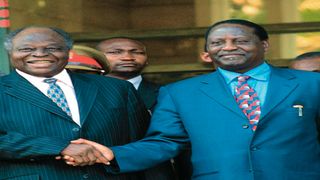
Then President Mwai Kibaki shakes hands with ODM Raila Odinga at Harambee House in Nairobi in 2008.
| File | Nation Media GroupOur Columnists
Premium
Shareholding, accountability and why ‘nusu mkate’ is dangerous
We are witnessing a momentous contest between two primary perspectives about the nature and purpose of representative democracy. Both cannot be right.
The reason why democracy spins off into political competition is connected welding authority with accountability, ensuring that the governing mandate accruing to the winner, is firmly entrenched in a robust system of checks and balances. The ultimate purpose of government, of course, is to serve the people in a manner that is fully consistent with their best interests.
The test of a democracy is not only in regards to providing a framework to assign governing authority and responsibility to attend to the people’s well-being, it is also to establish a mechanism for ascertaining the people’s fundamental aspirations and critical priorities.
A party or a coalition which wins the election must be understood to have prevailed, on a balance of evaluative parameters, in demonstrating a superior understanding of the people’s aspirations and providing a compelling strategy for actualising them. The other party must be deemed to have obtained a “room for improvement” or “ pull up your socks and work harder next term” return.
This is why grand coalition government arrangements inevitably become monstrous misadventures which ruthlessly punish all parties involved. The winner of an election is chastised for abdicating its governing authority by partially or wholly ceding its mandate and compromising its strategic clarity, while the runner-up is mortified for its greed and impatience through the onerous political encumbrance of partial incumbency.
Damage
It is also why nusu mkate are typically second-term affairs, to mitigate a winner’s damage, and why losers who gravitate towards the illusory enticements of power-sharing effectively banish themselves into bleak political wildernesses. The fundamental principles of representative government and competitive democracy are inviolable, and they exist to protect and promote the golden rule of politics and government: salus populi est suprema lex. Grand coalitions privilege political middlemen and other cynical intermediaries and keep the people out of the equation.
An addiction to post-election coalitions which obstruct the people from directly participating and benefiting from government, or obscures their central and vital role in sustaining the legitimacy of states, is a political pathology of the most malignant order.
Unsurprisingly, the reasons used to justify nusu mkate rarely have anything to do with the salient issues which defined the electoral contest and often entail perverse machinations to amplify them.
Incurable defects
Peace, for example, is an oft-abused value which magically escalates to the apex of priority considerations, the better to conveniently vault over inherent contradictions and incurable defects, as soon as the craving for power sharing strikes, making grand coalitions inherently perverse affairs.
The inherent contradictions do not stop there. You will have noticed, for instance, that the coalition which urged Kenyans to reject their competitors on the ground that granting them a governing mandate would have made Kenya a global pariah state, now criticises every positive report on the government and its leadership as evidence of being puppets.
Addled by the distemper of profound inconsistency and intractable self-contradiciton, the coalition leadership of the hitherto ‘darling of the West’ now profiles friendly envoys with the most toxic epithets.
The distinction between the governing and minority sides in government is not just an adventitious formality, it defines the foundation of authority, without which accountability cannot be enforced, thus insulating governance from the dysfunction of nusu mkate. It requires a clear delineation of that layer of the layer of administrative officers who enter government to steward the governing agenda, enabling the civil service proper, to align with the imperatives of an administration’s governing mandate.
This deciduous administrative layer comprises advisors and sundry functionaries whose remit is necessarily circumscribed and principally concerned with effective mediation between the bureaucratic administration and the governing platform of the political executive, ensuring that public service delivery expresses the governing mandate.
It is important to understand that this layer is distinct from the civil service and can acquire significant visibility and become the focus of political contention. However, by definition, they are the exclusive retinue of the mandated party. Riggy G’s ‘shareholder’ account of appointments to this cadre should not be problematic, except when it collides with the perverse expectations of nusu mkate addicts.
Arguably, the dysfunction of grand coalitions is attributable of the admixture of an adviseriat with irreconcilable programmatic orientation which makes any coordination impossible in the first instance, and displace all prospect of effective service delivery beyond the horizon of possibility.
Whether the minority side want to serve as an official opposition or not depends on their ideological bandwidth and political imagination. Grand coalitions and the accountability arising from the integrity of a governing mandate are mutually exclusive.
Any merger that doesn’t interfere with the mandate would therefore require the winding up of the runner-up’s platform and the full explicit subscription, by the minority, to the governing agenda. Nyayo understood this in 1997.
Anything in between is perilously delinquent, according to the first principles of politics and government.
Mr Ngéno is an advocate of the High Court





